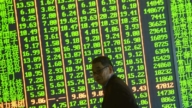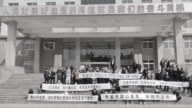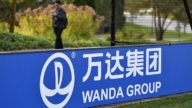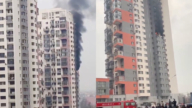【新唐人2013年09月30日訊】在中國實體經濟疲軟的同時,今年一線城市房價和地價卻漲幅驚人,而地方政府也並不像以前一樣,出來一些限制措施,相反,在數量龐大的三、四線城市遍佈「空城」的情況下,地方政府加快城鎮化建設卻沒有減慢步伐。外界認為,中共為了實現所謂保增長目標,加上地方債務償債的巨大壓力,在宏觀經濟不景氣,通過調整產業結構也不能達到目地的情況下,只好回歸依賴房地產的死路上。
最近,不僅北京農業展覽館地塊的樓面地價,拍出了每平米7萬3千元的天價,上海也出了新地王—-「新鴻基」以217億7千萬元贏得了「徐家匯中心」項目的開發權。而廣州、杭州、武漢等地的新地王們也在湧現。
美國南卡羅萊納大學艾肯商學院教授:「(我們)看一看北京、上海這些地王,是誰在購買﹖實際上我們發現,都是國有的房地產大企業他們自己在購買。仔細說白了,是中共政府自己在購買,把房地產的價格、地皮的價格炒了起來,再賣給老百姓。」
美國「南卡羅萊納大學艾肯商學院」教授謝田指出,如果房地產價格降下來,中國經濟必然放緩,隨之而來的,是失業率增加,以及出現社會動亂,因而中共政府不會真心希望房價降下來。對於地方政府來說,前些年賣地和基礎建設,給他們帶來了陞遷和發財的機會,更不希望房價降下來。
9月17號,英國《金融時報》刊文指出,新一屆政府在政策上刻意迴避地產調控,同時又推動「城鎮化」,再加上「救市」預期,以及承諾「收入倍增」目標。另外,人們對通脹的預期又非常強烈,擔心如果現在不買這些已經每平米高達2萬到3萬元的房子,未來可能永遠也買不起,因而北京遠郊樓盤剛開,就出現了恐慌性搶購潮。
北京、上海、廣州等城市的搶購風潮,又反過來為地方政府提供了趁機高價出讓土地的機會。今年上半年,一線城市的土地出讓收入創下歷史記錄。進入9月以後的「地王」,大多位於城市的黃金區域,政府選擇這些地塊在這個時候拍賣,無疑會給樓市製造更大的恐慌,引誘人們買房。
「四川社會科學院新聞傳播研究所」所長張立偉,在《地產泡沫將摧毀中國神話》一文中分析,中共政府「放縱」地產業瘋狂,其中的一個原因是「保增長」需要,上半年中國GDP增長逐步回落,新一屆政府有保增長的壓力。
不過,張立偉在文章中指出,這是一個毀滅性的策略,雖然人口眾多的一線城市還有剛性需求存在,但地價的上漲會讓低購買力的群體,最終無力承擔繼續攀升的房價,市場供需之間的鏈條最終會斷裂,「擊鼓傳花的遊戲」總會落幕。
謝田:「共產黨統治集團,它能夠得以支持,就是錢來支持,體現在哪裏呢﹖就是體現在房地產財政上,尤其是經濟放緩的時候,如果任其房地產泡沫破滅,那它等於在銀行作為擔保的土地都沒了的話,那實際上它的債務也全還不了了,債務一旦破滅的話,不光是地方政府會破產,會帶動中國那些銀行,國有銀行的破產。」
據《中國經濟週刊》分析,2011年,如果把北京的土地全部賣掉,可以製造出超過美國一年的GDP總量。現在北京,一個指甲蓋兒大小的地方,最高能賣4塊多人民幣。
北京天則經濟研究所副所長馮興元:「現在主要是住房供給比較單一,他不讓你自己去買地,自己去建房,合作社建房或者互助儲蓄之類的,沒有這類東西,就是單一的從開發商那裏買房子,加上土地一級市場是政府買方壟斷,低價從農民那裏進,儲備以後再高價掛市場出售。 」
《新華社》8月底報導,地方政府償還債務巨大,多個地方政府醞釀上調基準地價。此舉可能抬高未來土地出讓的底價,進而為地價上漲提供動力。
「北京天則經濟研究所」副所長馮興元還指出,中國目前閒置的房子很多,但短期內出臺徵收房產稅的政策困難很大,因為其中特權階層擁有的房子也多。
採訪編輯/劉惠 後製/舒燦
China Housing Costs Surge as CCP Seeks Economic Growth
As China’s real economy worsens, house and land prices
in its first-tier cities continue to increase at
an astonishingly high rate.
And this time, the Communist government hasn’t ordered
any restrictive measures as they did before.
On the contrary, while “Ghost Cities” have spread over
a large number of third- or fourth-tier cities,
Chinese Communist Party (CCP) authorities show no signs
of slowing down urbanization construction plans.
Commentators say that CCP leaders are still attempting
to achieve their economic goals, but the burden for its local
governments to pay off debts is becoming heavier.
As a downturn in macro economy cannot be avoided even
by strategic adjustment of industrial structure, the CCP has
returned to the dead-end road of producing economic growth
from the real estate industry.
Recently, a Beijing plot near the National Agriculture
Exhibition Center was sold at a record high unit price of
73,000 yuan ($11,900) per square meter.
In Shanghai, Hong Kong-based Sun Hung Kai Properties also
won an auction for a commercial land plot in Xujiahui District
at a record total price of 21.7 billion yuan ($3.54 billion).
The same story is also taking place in Guangzhou, Hangzhou,
Wuhan and many other Chinese cities.
Xie Tian, professor at University of South Carolina Aiken
School of Business: “Let’s have a look at the buyers of those
most expensive lands in Beijing or Shanghai.
Who’s buying them? Indeed we find that it’s mostly
state-owned real estate enterprises.
In other words, it is the CCP government itself
that is buying the lands.
The goal is to raise house and land prices before
selling them to the ordinary Chinese people.
Xie Tian says that if real estate prices drop, there will
inevitably be a slowdown in China’s economic growth,
followed by an increased unemployment rate
and increased social unrest.
Therefore, there is no way that the CCP
really wants the house price to drop.
For local governmental officials, they have had chances of
promotion and making profits through land sales and
infrastructure projects in the past years,
so even less did they want to see a drop in house prices.
On September 17th, an article published in the Chinese
website of UK-based Financial Times says that the new CCP
leadership has deliberately ignored any adjustment
in the real estate market.
In the meantime, it is still promoting its urbanization plan,
preparing for a possible bailout with a promise to “double
per-capita income by 2020”.
In addition, the Chinese people are in great anticipation
of the coming inflation.
They worry that if they don’t buy 20,000-30,000 yuan ($4,900)
per square meter houses now, they won’t be able to later.
Due to all these factors, a panic buying boom was seen
right after a real estate on the outskirts of Beijing was
opened for quotation.
The panic buying waves in Beijing, Shanghai and Guangzhou
has offered chances for local governments to sell more
lands at high prices.
In the first half of 2013, the total income from land sales
in many first-tier cities had hit historical highs.
In September, the lands that were sold at record high prices
are mostly located in the best area of the cities.
As the local governments chose to sell those lands at
such a point in time, there is no doubt that they will make
more panic among people in buying houses.
Zhang Liwei is bureau chief at the Institute of Journalism and
Communication, Sichuan Academy of Social Sciences.
In his Financial Times article titled “Real estate bubble will
destroy the myth of China’s growth”, Zhang wrote that
the CCP government is giving too much freedom to
the real estate industry.
One reason for that is its goal to “maintain economic growth”.
As in the first half of 2013 China has seen a drop in
economic growth, the new leadership has the pressure
on their shoulder to maintain strong growth.
However, Zhang says that this is a devastating strategy.
Although rigid market demands still exist in first-tier cities,
surging land prices will eventually leave people with less
purchasing power and unable to afford the high cost of homes.
The demand and supply chain will finally be disrupted,
and the “game of hot potato” will finally be over.
Xie Tian: “The CCP group is still able to support its regime
because it has money.
Where does it get that money?
From the real estate industry.
Especially when the economic growth is slowed down,
if the party let the real estate bubble burst,
it will lose all the warranted lands in the bank, and indeed
it will not be able to pay off any debt in such a situation.
If this happens, all of China’s state-owned banks
will go bankrupt, not to mention all local governments.”
According to an analysis by China Economic Weekly in 2011,
if all the lands in Beijing were sold, it could produce
an economic product equivalent to
the annual GDP of the United States.
Currently in Beijing, a nail-sized piece of land
can be sold for over 4 yuan ($0.65).
Feng Xingyuan, deputy director of Beijing Institute of
economics: “A problem is that we have very limited sources
to get a house for residence.
You are not allowed to buy land, construct a house
individually or cooperatively, or establish credit unions.
There is nothing like that. People simply buy houses
from developers.
The market has been monopolized by the government
at the land level.
They buy lands at very low prices from peasants,
then sell them on the market at high prices.”
As many local governments are in huge debts,
Xinhua News Agency reported in late August that many
are planning to increase the standard land price.
Such a move may raise the basic price of land transfer,
and further motivate the land price to increase.
Feng Xingyuan, Beijing Institute of economics deputy director,
also says that although there are many idle houses in China,
it is still very difficult to impose property tax immediately.
The reason is that, many of those houses are owned by
privileged classes of the party.

























